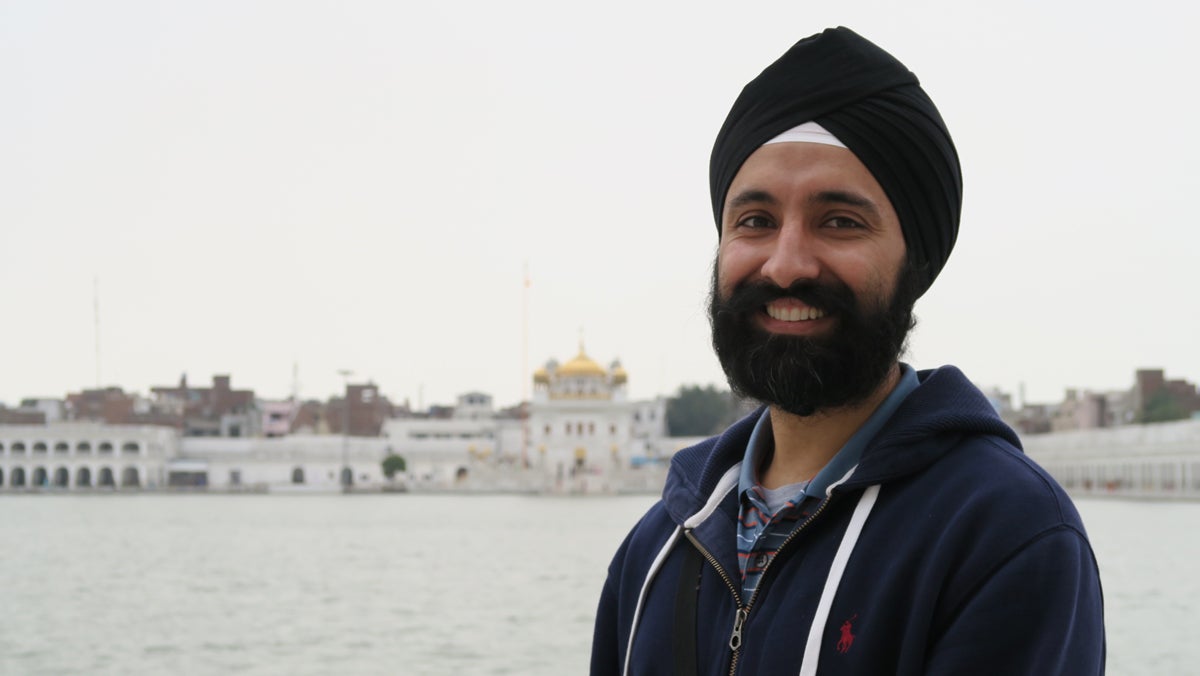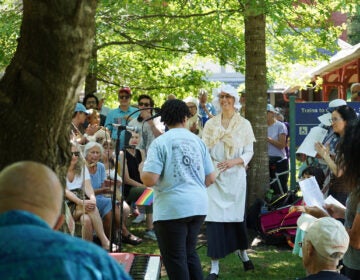Working to better the world as a tenet of one’s faith

Savraj Singh is shown at the Tarn Taran Gurudwara, Sikh place of worship, just outside of Amritsar, India. (Image courtesy of Savraj Singh)
“We should be here to make the world a better place when we leave it.”
It’s not an unusual idea, and I hear it from all kinds of folks and perspectives, sometimes yelped from the trenches and sometimes tossed off more glibly. But what really gave it traction when I heard it this time was the way the speaker connected it to the beauty of his faith tradition, linking a simple — and admittedly sometimes simplistic — idea to a deep, complex religion that was anything but simplistic.
Savraj Singh is founder and CEO of Wattvision, based in Princeton. The company helps homes and businesses save money on energy by giving them real-time data on their energy use. Singh is also a practicing Sikh.
I’ve long respected the American Sikh community. As followers of the only religion that actually requires the wearing of turbans (for men — and for women who choose to) to express their faith, American Sikhs have been subject to discrimination, at best, and hate crimes, at worst. My observation is that Sikhs have consistently met such intolerance with patience, a desire to educate people about Sikhism, and a refusal to take the bait of playing a blame game. Such tenets of honesty and integrity in Singh’s faith were intertwined with his experience of his work.
Searching for meaningful work
Especially in light of his innovative start-up — which he began by making sensors and software in his parents’ basement — I was interested to hear what being “human at work” meant to someone who takes humanity so seriously.
“What comes to my mind is why I started Wattvision,” Singh says. “I had been working at Microsoft in Seattle. It was interesting, but at the end of the day when we were debating the position of a button hidden deep in some menu, it felt a little crazy, debating something not that important.”
He felt he was missing something, something that would have more of a direct impact on people, the environment, and the world. “That’s part of my humanity,” Singh says. “We should be here to try to make the world a little bit better of a place when we leave it.”
He says he doesn’t really remember a specific moment when he decided to make a move. “It was a gradual conclusion,” he says. “I tried several things, including another start-up after leaving Microsoft, but that created the same feeling of working on something financially lucrative but not fundamentally fulfilling. My heart wasn’t in that one.”
But his heart was definitely in having a positive impact on the environment. “[Wattvision] is about feeling fulfilled with what you do, making the world a better place. It’s true. I can say at least we tried to help people save money on energy and conserve energy. If we’re more efficient with our usage, we can change the landscape of energy use in America.”
In fact, when we spoke Singh had just gotten back from a trip to India where he observed a much higher level of energy efficiency. “They’re very energy efficient, because they have to be,” he says. “There are more brown-outs. They have to be judicious. Here, we have the luxury of more than we need, so we’re not as efficient with it.
Ethical success = honesty, hard work, integrity
“Now I feel more human in my work — meaning, in touch and human in the world in a way that helps improve the world. I have a lot of friends at Microsoft, and, don’t get me wrong, it was a great place to work, and the people were amazing — [but while I was there] I kept asking myself why I couldn’t just enjoy it like they did. They didn’t seem to think so seriously about things. I’m perhaps too idealistic in my thinking, but I still feel like it’s important to work on things you can get deeply excited about, that help people directly.”
But it extends to more than the product; for Singh, his personal values have a direct connection with how he handles his business day to day. “Some argue that in business, you must push the limits of your ethics to succeed,” he says. “But to me, success is about honesty and hard work. Part of me being human at work is being the kind of morally good person whom I would trust to do business with, myself.”
There are three golden rules in Sikhism, he explains: to meditate and pray; to earn an honest living; and then to distribute to others first and then take for yourself. “The last tenet is called vand kay chuk in Punjabi, and it’s a very important idea. It can be through donation — and it can be through the work you do, itself.”
I found that to be a knock-out. Most faith traditions have very fine practices of seeing what you’re given as divine, in some way, and giving a portion of it back, even as “first fruits,” as an important charitable practice. But this really flipped the paradigm. Whether with our material goods or the work and energy we put into the world, it is first for the world, and from it we take for ourselves only secondarily.
“When I went to India for the first time,” Singh remembers, “I was struck by the generosity of the Sikhs there, how dedicated everyone was. What little I’ve done doesn’t really match up. There’s still a long way to go to serve others, to do well, to remember God. I’ve just scratched the surface. I’ve got a long way to go to be a good Sikh or student.” (“Sikh” means follower or student.]
But in his story, I already found he had given first and foremost to me, and I appreciated the gift.
—
Join Susan Richardson on April 14 for a discussion with Philadelphians about finding meaning in the work we do, and connecting it with the city around us. City and Self: Bringing Humanity to Work is free and open to the public, but you must register in order to attend.
WHYY is your source for fact-based, in-depth journalism and information. As a nonprofit organization, we rely on financial support from readers like you. Please give today.




